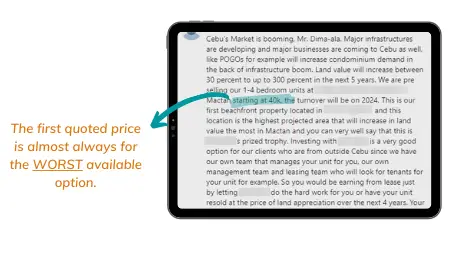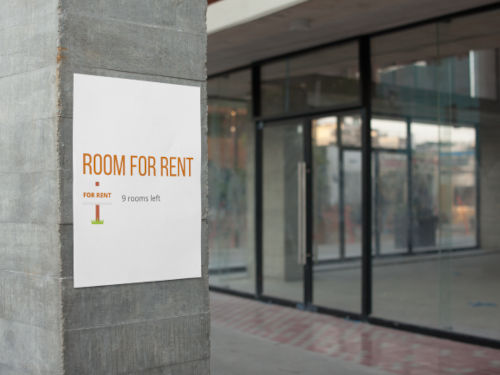Real estate is the single largest purchase we make. I don’t know about you, but I certainly would like the most accurate picture possible. I’m not about to spend a fortune without proper due diligence, and so I’ve compiled some of the important things real estate brokers and agents probably don’t tell you.
It’s without the realtors’ malicious intent, I assume. But I hope these help give you a holistic and fair picture of your future purchase.
Here are 7 important things your realtors might have forgotten to say.
Page Contents
1. “Will” really means “might”
“This property WILL continue to appreciate in the coming years.“
Doesn’t that sound strangely familiar?
Realtors don’t tell you that “will,” “surely,” and “guaranteed” are really just possible outcomes, not absolute. The fact of the matter is, no one knows for sure where the market is headed tomorrow. How can anyone possibly know its direction 5 years from now?
We can make educated forecasts, but there are just too many variables to know for certain. Please be careful with real estate brokers or agents who guarantee and insist on future results.

2. The supply in the area
“Infrastructures are being developed and major businesses are coming.“
Real estate brokers and agents readily provide details of increasing demand in an area. But they rarely pair that with data on supply. Why is this important?
Selling prices and rental rates ultimately depend on BOTH supply and demand. Whether the demand for houses in an area is 100 houses or 1 million houses, the existing supply still forms part of the equation. If supply is equally as high, then that devalues the high-demand information.
In other words, if demand for an area is, say, 1 million houses, does that make it a good deal?
Probably not if the supply in the area is for 2 million houses. You’re basically forced to sell or rent at a lower rate to meet the demand. Knowing supply paints a clearer picture.
Realtors don’t tell you about the supply in an area.

3. About the agency problem
Real estate brokers and agents get a commission when they close a deal and it doesn’t matter if it’s a good deal for you or not.
This creates alignment problems between your goals and the realtor’s goals.
In theory, real estate brokers and agents should act in the client’s best interests. But in reality, they naturally care for themselves more. And rightfully so.
Having a dedicated broker for the buyer and another for the seller somewhat lessens this problem, but not entirely.
Here’s a good real estate broker
A good realtor is one who promptly declines a deal that’s disadvantageous to her client.
For brokers and agents reading this, please think of it as an investment in goodwill. Your clients trust you more and eventually close a future deal with you.
Avoid our repeated mistake
Even with an agent or broker, don’t rely on them to follow up on the necessary paperwork.
Some agents get paid after your down payment, and some down payments are spread out over 1 to 2 years.
Call it ignorance or something else, but we forgot about our monthly amortizations and relied on our broker to remind us. The late payment penalties then outweighed the benefits, and we let the project go. This has happened to us and has happened to my parents. Life is short, so learn from others’ mistakes — learn from this.
Do your own research
Have you heard of a real estate broker or agent criticize any part of a project their selling? It doesn’t happen and you shouldn’t expect it to. You could say though they’re advocates of the development and so have nothing but good things to say.
My point is, you cannot reasonably rely on a realtor to provide objective opinions on a project they’re selling. It’s up to you to do your research.
A good alternative is to hire a real estate broker, agent, or consultant who has no stake in the project you’re interested in.
4. Renting isn’t always a waste

Realtors don’t tell you renting is sometimes a better option. Buying has a strong case when the costs of buying are close to the costs of renting.
I do recommend buying, over renting, a majority of the time. It is after all my preferred vehicle for true financial freedom.
But you’ve probably guessed where this is going. Renting, although not my preferred option, isn’t always a bad choice.
The gist is, renting avoids maintenance costs, property taxes, insurance fees, and large down payments. In a renter’s market, where renting is the more economical choice, you probably won’t hear your realtor say that.
5. “Investing” is loosely defined
Real estate brokers and agents package buying real estate as “investments” that grow your wealth.
They’re technically correct though. In the accounting sense, real estate is a long-term asset and any purchase of a long-term asset is classified as an investment.
But when we think about investments as purchases that grow wealth, a lot of what’s being sold by realtors disappoint. Most are really just properties for personal use.
If you find a realtor who clarifies this minute difference, you’ve got yourself a keeper.
6. The starting price is for the worst option

Realtors don’t tell you that the starting price for any offer is for the worst option.
When a realtor sends you a prospecting letter with phrases like “starts at” or “for as low as,” that’s almost always a price for their worst offering.
Whether that’s in an oddly placed unit or for the smallest room type, it’s a marketing approach that has become the norm.
7. You don’t need them to sell your house
Realtors don’t tell you that you can sell your house yourself. As set out in the Real Estate Service Act, real estate brokers and agents need proper accreditation to buy or sell properties. Owners though are exempted from this requirement.
As long as you’re selling your own property, or buying for yourself, you actually don’t need a realtor and you can save on some costs.
Having them does make the process easier though, with their networks and resources. It’ll be your call if you think they bring in more than they cost. Now is a good time to assess your realtor. If they’re honest and transparent with a lot of the previous 6 points, then you definitely have a realtor that’s worth having on board.
Making an exhaustive list is tough and I’m sure I missed a lot of other important points. What can you add to this list? Please help the community by listing them in the comments section below.
Read more, select a topic:







